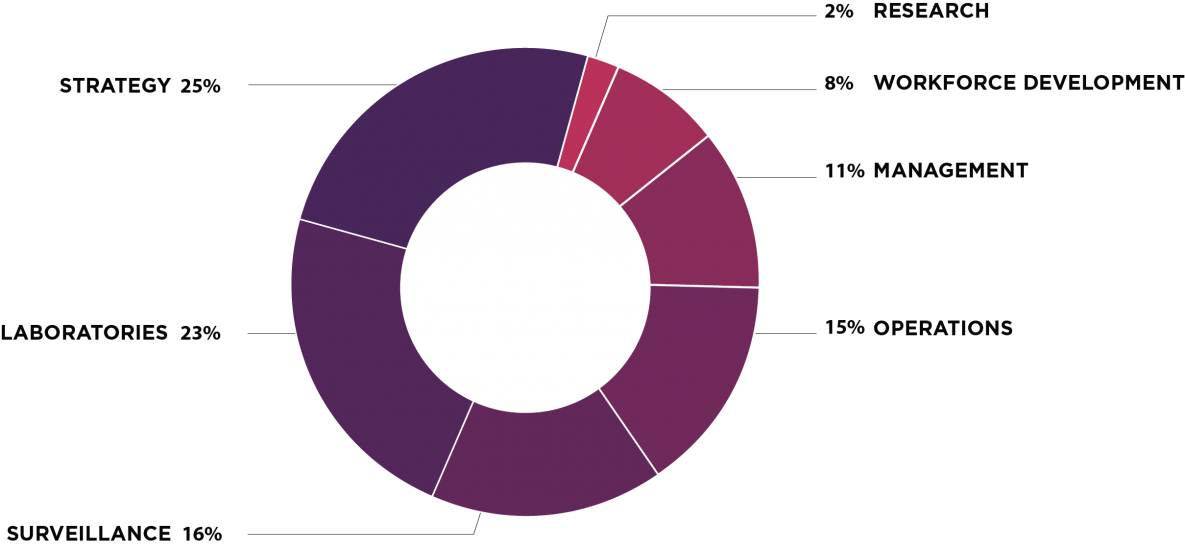CDC’s National Public Health Institute Program Report (September 2020)
May 27, 2021
The Centers for Disease Control and Prevention’s (CDC) Division of Global Health Protection (DGHP) collaborates with Ministries of Health (MOH) and other partners to support countries in developing and strengthening their own National Public Health Institutes (NPHI).
Functional NPHIs create enabling environments for more effective responses to public health emergencies.
Building upon outcomes achieved through global health security efforts, NPHIs serve as homes for public health to assist countries in making quick and effective decisions that save lives.
NPHIs are smart investments. They strengthen and serve as homes to coordinate and implement linkages among critical global health security functions including disease surveillance, laboratory, emergency preparedness and response, and workforce development. By unifying national public health activities, the NPHI Program helps countries prevent, detect, and respond to disease at its source.
Strong NPHIs decrease reliance on current and future U.S. assistance. They detect and respond quickly to public health threats without the need for outside assistance. NPHIs serve as focal points for science-based leadership and coordination, due in part to their ability to plan, coordinate, and implement public health initiatives. NPHIs also serve as the public health entity accountable for commitments and reaching targets.

Without an NPHI, public health activities can be fragmented with responsibilities spread across multiple entities in the health system. This can lead to inefficiency, a lack of leadership and accountability, and ultimately, a reduced programmatic impact. These activities function most effectively with a coordinated, well-designed approach.
NPHIs provide the connection among key public health functions, improving communication and efficiency to ultimately respond more quickly to public health threats. DGHP’s NPHI Program additionally leverages expertise across CDC with the goal of forming and strengthening partner institutions to combat health security threats.
The case studies below demonstrate CDC’s technical assistance activities in strengthening NPHIs, in areas such as laboratory, surveillance, workforce development, and public health emergency management. With CDC support for activities that cross disciplines, such as the ones shown below, NPHIs are able to tackle issues that are important to multiple sectors.
This also helps to strengthen linkages among different groups within the NPHI, which helps the institute operate more efficiently and have greater impact with limited staffing and financial resources.
Cambodia’s National Institute of Public Health (NIPH) is operationalizing and leading a working group that facilitates policy dialogue to improve the understanding about public health professions and importance with promoting recognition and use of public health professions in Cambodia.
- Health Promotion
- Workforce Development
Colombia National Institute of Health (INS) responded to the Zika epidemic by efficiently handling the increase of laboratory specimens while conducting disease surveillance and coordinating research to learn more about this emerging infectious disease.
- Public Health Research
- Surveillance
- Laboratories
National Public Health Institute of Liberia (NPHIL) is working toward a sustainable organization by training engineers to assess, repair and certify biosafety cabinets. This creates a safe working environment for laboratorians.
- Laboratories
- Workforce Development
Since 2011, CDC’s NPHI Program has supported more than 25 countries at varying levels of engagement, working with the world’s most vulnerable health systems and in potential disease hotspots. CDC invests in the internal functions that make an NPHI strong and function more efficiently (e.g., strategic planning, operational planning, communications, human resource development, and financial management).
Investing in these internal functions improves the NPHI itself and results in the external functions, the science that improves public health, being executed more effectively.
We also invest in the science (surveillance, laboratory, workforce) and focus on where the external functions (e.g., stronger linkages between epi and lab, workforce and emergency preparedness) can work better together.
CDC NPHI Investments by Program areas 2015-2019

CDC helps promote global health security and regional self-sufficiency by connecting neighboring NPHIs. Collaboration across borders is essential to prevent, detect, and respond to public health threats like Ebola or cholera. The Zambia National Public Health Institute (ZNPHI) hosted 16 Southern African countries for a workshop focused on regional public health threats. Leaders came together for an emergency management workshop coordinated by the Africa CDC.
As the Southern Africa Regional Collaborating Center (RCC), ZNPHI was a natural choice for hosting cross-border discussions. CDC with the International Association of National Public Health Institutes (IANPHI), has supported ZNPHI’s development, including strengthening their public health emergency management (PHEM) functions. In Zambia and many other counties, NPHIs serve as focal points for emergency response and coordination.
This regional PHEM workshop helped countries refine priority actions for emergency management and build cross-border, intraregional and international relations and networks that will be essential for efficient and coordinated responses to public health events.
NIGERIA
“If I was the minister of health, I would want to know whom to call. My minister knows he can call me if there is a problem. He doesn’t want to have to call the lead for surveillance and then emergency response then the lab.”
COLOMBIA
“The Venezuelan migrant crisis provides another example of the role INS has in public health surveillance and response, as well as the value of continuously strengthening these capabilities and related resources. Being prepared and having a plan for every risk has helped us be more responsive to this and other public health emergencies that arise within and beyond our borders.”
MOZAMBIQUE
“I am grateful for your assistance during the recent health emergencies as a result of the Idai and Kenneth cyclones in Mozambique. The capacities developed at the INS through your NPHI support program, particularly the strengthened surveillance system, were key in the back-to-back emergency responses this year.”
CDC NPHI program has supported Africa CDC and MOHs in the following countries: Bahamas, Botswana, Burkina Faso, Cambodia, Cameroon, Colombia, Cote d’Ivoire, Democratic Republic of the Congo, Ethiopia, Ghana, Guatemala, Guinea, Guinea-Bissau, Kenya, Liberia, Mali, Morocco, Mozambique, Myanmar, Namibia, Nigeria, Pakistan, Rwanda, Sierra Leone, South Africa, Togo, Uganda, Ukraine, Zambia.